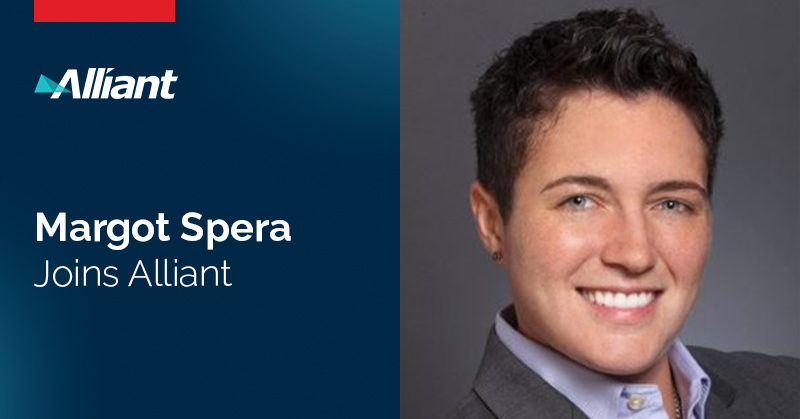Specialty Podcast: Key Takeaways from REITwise 2024: Law, Accounting and Finance Conference
By Alliant Specialty
Following his participation on the Insurance Committee session panel at Nareit's REITwise 2024: Law, Accounting and Finance Conference, Tim Crowley, Alliant Management & Professional Solutions, provided a recap of the key takeaways from his panel discussion, as well as the conference as a whole. Tim discusses the current D&O insurance market for publicly traded equity REITs, trends and outlooks for securities class action filings and the new SEC disclosure requirements for environmental impact.
Intro (00:00):
You are listening to the Alliant Specialty Podcast, dedicated to insurance and risk management solutions and trends shaping the market today.
Ghevon Sebastian (00:08):
Welcome back to another Alliant Specialty podcast. My name's Ghevon Sebastian, and today I'm joined by Tim Crowley, Senior Vice President in our Management and Professional Solutions group. Welcome, Tim.
Tim Crowley (00:19):
Good afternoon. Thanks for having me.
Ghevon Sebastian (00:21):
So, you recently spoke on the insurance committee panel at Nareit's REITwise: 2024 Law, Accounting & Finance Conference, which is really focused on the current issues affecting real estate, whether it's legal, financial or accounting operations. I would love to hear from you about the main takeaways for you after attending and speaking at REITwise. Why don't you go over the current D&O market for REITs that you discussed with the membership?
Tim Crowley (00:46):
Yes, thank you. First, it was really good to see the membership again coming out of COVID. This was a conference that was attended at very near levels since before the pandemic, so it was great to see the community and all the different clients and insureds and risk folks from the Nareit membership in person again this year. When we spoke at the insurance committee conference, we were joined by members of Arch Insurance Company, who are the underwriters for the D&O insurance program for Nareit. We spoke about the insurance market for publicly traded companies overall, and then we also spoke about it specifically for REITs. And, post pandemic, as many of our clients and listeners probably experienced, we witnessed probably the hardest D&O insurance market in roughly 20 years. And we have now started to come out of that over the last two or three years, meaning '22 and '23, we experienced very favorable insurance outcomes for renewals, both in the public company D&O sector overall and within the REITs as well.
For public company D&O renewals in 2023, we experienced again very favorable renewals with respects to premiums, retention, coverage, et cetera. Ultimately, I think a lot of the claims that were anticipated coming out of the pandemic in and outside the real estate sector maybe didn't bear as much fruit as some folks on the underwriting side anticipated. And additionally, we've experienced a lot of new capital in the market and increased competition in the market overall. So, for public companies in 2023, especially in the second half of the year, we experienced anywhere from potentially 7.5% to even 15% or greater depending on the renewal and the size of your program. That was largely consistent with the REIT space as well, maybe a touch less. What we've experienced is that you're probably seeing in the first quarter of 2023, seeing somewhere between five to 10% decreases on the primary policies, and you're increasing the magnitude of those savings with some of the excess markets.
Although most recently in the quarter, we have started to see minimum premiums come into play again on higher levels of capacity. But we expect in 2024 a lot of these trends to continue resulting in favorable renewals, but probably not to the level of savings that those insureds experienced in the calendar year 2023. And that's similar for REITs as well. It's probably a little bit less. The REIT market does tend to trail the overall public D&O market a little bit, and that's been a trend that we've seen over the last 15, 20 years. But again, I would expect favorable outcomes for renewals in 2024, but maybe just not to the extent that we saw last year.
Ghevon Sebastian (03:25):
Thanks, Tim. Yes, so it sounds like we saw some really good things after COVID, and now it's starting to mellow out a little bit and go back to the normal pre-COVID market.
Tim Crowley (03:35):
Yes, I think that's a good way to put it.
Ghevon Sebastian (03:36):
Could you provide us with some insights into the securities class action environment facing the public companies and specifically REITs?
Tim Crowley (03:43):
Yes, great. The securities class action market for calendar year 2023 is now being analyzed. Some of the trends that we experienced are a little interesting or maybe not what some folks anticipated, but I would say that the securities class action levels are back to pre-2017 levels, which did escalate during the COVID years, which also saw a large increase based on things like IPOs and SPACs and dSPACs. So, while there was a mild increase in the total securities class action filings in 2023, 215 compared to 208, it's pretty consistent, right? And in 2021, it was 218. So, these last three years have been very similar in what we've experienced, but we are seeing some of the litigation rates for core filings up just slightly 3% to 3.2%. However, the dismissal rates are holding fairly steady, roughly in the 49 to 55% or so range.
And we'll continue to monitor those. The claims that were filed in '22 and '23 are still working their way through the courts. One thing I find somewhat interesting, and I believe the membership does as well, is that given some of the changes in the types of companies in the SEC and other regulators in the plaintiff's bar, what I think is notable is that the most common allegations in these securities class action lawsuits are pretty consistent to what we've seen for the last decade. And that would include 10b-5 allegations, false and misleading statements, false forward-looking statements and certain accounting violations. That’s true for the overall market, and it's pretty consistent in the REIT space as well. For REITs, the frequency level is quite a bit lower than what you would see outside the sector.
In 2023, there was only three total securities class actions that we would deem to be core. And what we have seen is that while there's been fewer settled securities class action in the REIT space recently, the settlements have displayed that the REIT settlement sizes don't differ materially from non-REIT securities class action. So, pretty consistent there. What I would say is that in the REIT space as well, the most common allegations continue to mirror the broader SEC environment for companies of all industry sectors. I would say in those recent years, most material core REIT securities class action filings have centered around allegations of false or misleading statements, and more so in the REIT space, obviously those allegations involving tenant issues and the impact on that specific REITs business.
Ghevon Sebastian (06:06):
Thanks, Tim. Given the new SEC disclosure requirements for the environmental disclosure, could you please provide us with some of the information that you discussed at the conference?
Tim Crowley (06:15):
Yes, us and our partners at Arch Insurance, we've spent a good amount of time trying to analyze the new disclosure. First, the SEC disclosure requirements and the final climate change disclosure guidelines were adopted in early March. It's certainly early days both in working with our clients on how they're going to respond. Is there changes necessary to the business? Is it changes necessary to certain disclosures? And frankly, even as the underwriters adopt to how companies respond, they may or may not change their appetites for risk. But I think at this point, a lot of people are really focusing on identifying what components of the disclosures impact their business the most and what changes are needed to be done to the business looking forward. We have the SEC disclosures. We've also got a California Climate Accountability Package that was adopted or signed in October of 2023.
And there's also, the European Union adopted a similar piece of regulation in July of 2023. All of these things, I think it's going to take a little while to see how everyone responds and how these regulatory bodies review and monitor the different disclosures. But I think one key takeaway is that every business in and outside the REIT sector, but certainly in the REIT sector, are going to be having to monitor these changes appropriately, both with internal counsel, external counsel. The sector overall will be monitoring to see what the impact of this is, both in the short term and the long term.
Ghevon Sebastian (07:43):
That's great information, Tim. So, if any of our listeners want more information on the D&O program for REITs, how do they go about doing so?
Tim Crowley (07:51):
Great. Yes, here at Alliant, we've partnered with Nareit and their members for more than 30 years. We have an exclusive arrangement with the insurance underwriters at Arch Insurance Company that provides a manuscript D&O insurance policy form to correspond with all the latest and greatest securities class action trends and non-securities class action trends to provide broad coverage to the REITs themselves, but almost more importantly, the individual directors and officers to protect their personal assets. You can feel free to contact me. My name again is Timothy Crowley at Alliant, so that's Timothy.Crowley@alliant.com, and we'd be happy to answer any of your D&O needs for the REITs and their membership.
Ghevon Sebastian (08:32):
Thanks, Tim. I really appreciate you being on the podcast today and giving our listeners a little bit of an overview for the REIT market. If you'd like more information, please visit our website at Alliant.com. Until next time, thank you.
Alliant note and disclaimer: This document is designed to provide general information and guidance. Please note that prior to implementation your legal counsel should review all details or policy information. Alliant Insurance Services does not provide legal advice or legal opinions. If a legal opinion is needed, please seek the services of your own legal advisor or ask Alliant Insurance Services for a referral. This document is provided on an “as is” basis without any warranty of any kind. Alliant Insurance Services disclaims any liability for any loss or damage from reliance on this document.
Thanks for your message.
We’ll be in touch shortly




